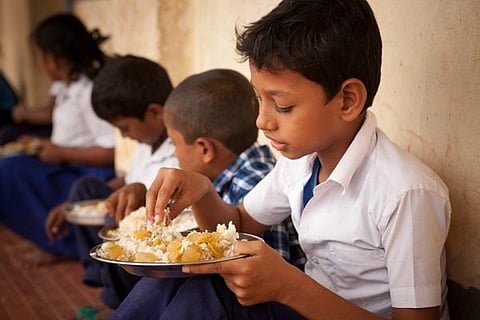

In a positive move, government school children in Karnataka will be provided eggs six days a week, an increase from the current two eggs a week, as part of the mid-day meal scheme. Eggs will be on the menu along with the state’s existing fare of rice, pulses, vegetables, and ragi malt.
Speaking to media persons on Wednesday, July 17, Minister for School Education and Literacy Madhu Bangarappa said that a Memorandum of Understanding (MoU) will be signed with the Azim Premji Foundation on July 20 in the presence of Chief Minister Siddaramaiah and former Wipro chairman and philanthropist Azim Premji. The MoU reportedly outlines a three-year partnership under which the Foundation will contribute Rs 1,500 crore to provide eggs daily to school children.
The political backdrop for the inclusion of eggs in the mid-day meal scheme must be noted. Though activists have demanded inclusion of eggs for years, Brahmanical notions of ‘purity’, so-called ‘sattvic’ diets, and Hindutva ideology have trumped the nutritional needs of socio-economically vulnerable children from Adivasi, Dalit, and Other Backward Class (OBC) backgrounds. Activists further pointed to the severe malnutrition among children from these backgrounds, particularly deficiencies in Vitamin A, B12, zinc, and iron. Meanwhile, opponents had made absurd claims that providing children eggs would turn schools into ‘military hotels’ – a common euphemism for affordable eateries that serve a wide variety of meat dishes.
In 2021, the BJP-led state government under then CM Bommai introduced eggs twice a week, as a pilot scheme, in the mid-day meals for students from classes 1 to 8, in the districts of Bidar, Yadgir, Kalaburagi, Raichur, Koppal, Vijayapura, and Ballari. These seven districts had been identified as the most backward in the state. The state government, despite opposition from the Hindu right-wing and Lingayat groups such as Rashtriya Basava dal, Lingayat Dharma Mahasabha, Akkanagalambika Mahila Gana Karyakartharu, and others, stood its ground and also pointed out that the alternative of bananas would be available to children who do not wish to consume eggs.
In July 2022, the state government extended its egg policy to all government schools across Karnataka. Helping its stance was a report by the Karnataka State Rural Development and Panchayat Raj University in Gadag. The report showed a positive improvement in nutrition levels, weight, and body mass index (BMI) of the students from Yadgir compared to students from Gadag district which had not been a part of the pilot project.
Read: Eggs benefitted children in Karnataka says study, will haters back down?
Speaking to TNM, Dr Sylvia Karpagam, a well-known public health specialist and long-time advocate of including eggs in the mid-day meal scheme, welcomed the move, saying that it is long overdue. “What we have always found on the ground is that the majority of children like eggs. We’ve particularly noticed that school absenteeism reduces on the days eggs are provided in the mid-day meal. From the health perspective, the state government’s mandate for protein servings in the mid-day meal scheme is 12 to 20 gms per serving per child. A 60 gm egg can provide 8 gms of protein.”
Sylvia also cautioned the state government not to discontinue serving milk to school children under the Ksheera Bhagya Scheme as the number of eggs provided is being increased. She further suggested that students who do not consume eggs can be given an extra glass of milk under this scheme. She pointed out that bananas or chikkis alone cannot compensate for the nutritional lack from not consuming eggs.
She also recalled the 2019 controversy when Akshaya Patra Foundation, a religious organisation that had an MoU with the state government to serve mid-day meals, refused to serve garlic and onion in their food claiming that neither were suitable for a so-called ‘sattvic diet’. The sattvic ideals for food are entrenched in puritanical-Brahmanical notions that garlic, onion, and eggs are ‘unclean’.
“We welcome the state government’s move to provide eggs daily as it has been a long-standing demand. However, it is surprising that the state government is turning to corporate entities instead of allocating funds from its own coffers. We’re concerned that over time corporate interests will influence government policy, as it often happens in such cases,” Sylvia added.
Also read: Ground report: A warm plate of breakfast is TN govt's solution to student absenteeism